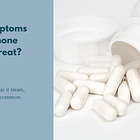Hormone Therapy and Breast Cancer
Explaining the 2002 drama and subsequent fall out from the Women's Health Initiative.
Ever heard that menopause hormone therapy (MHT) causes breast cancer?
We’re talking all about the MHT-related breast cancer scare in 2002 and how all that drama may still impact your menopause care over two decades later.
Alright, start from the beginning. What happened and why?
First, a little history:
Menopause hormone therapy has a long, complicated history starting all the way back in the late 1800’s, mainly focused on keeping women looking youthful for their husbands (insert ENORMOUS eye-roll here).
However, in the 1980’s and 90’s, MHT - particularly estrogen - gained popularity after several observational studies showed that supplemental estrogen might protect women from heart disease, osteoporosis and dementia.
Eventually, the National Institutes of Health funded a large-scale study of 164,000 women to determine the true impact of menopause hormone therapy. 64,000 women were enrolled in a randomized study that controlled for placebo effect and other confounding factors. In plain English: some of the women enrolled in the study were given placebo medication, and others were given actual hormone therapy so that researchers could compare the findings from the two groups to each other.
In addition to the randomized study, 100,000 women were enrolled in an observational study.
The goal of the study - called the Women’s Health Initiative or WHI - was to figure out if menopause hormone therapy did indeed protect women from heart disease and osteoporosis. The study also hoped to determine if hormone therapy led to increased risk of breast and uterine cancer, blood clots, and dementia.
Just 5 years into the 8 year study, the National Institutes of Health halted the hormone arm of study due to an increased risk of breast cancer and lack of evidence that hormone therapy protected against heart disease. In fact, preliminary data suggested that hormone therapy led to increased risk of breast cancer, heart disease, stroke and blood clots.
Wait, what? Then why would anyone want to take menopause hormone therapy now???
Doctors and researchers have had two decades to pore over the findings from the Women’s Health Initiative, and have found several big issues with how the data was initially presented.
A few important things to note from the study:
The breast cancer risk was no different from what researchers had already learned from previous studies on hormone therapy. Hormone therapy does slightly elevate breast cancer risk by 6 additional cancer cases per 10,000 women per year (less than 0.1%), which is considered very low risk in the medical community.
Estrogen-related heart complications were only higher in older women; they were not an issue in women who started hormone therapy before age of 60. And women who started hormone therapy within 10 years of their final menstrual period actually had a lower than expected risk of heart disease.
There is no increased risk of death for women who take hormone therapy vs. women who do not take hormone therapy, despite the slight increased risk of breast cancer.
In the study, all women given MHT were prescribed the same medication. We have since learned that different formulations, doses and delivery types (pill, patch, cream, etc.) of each hormone have slightly different associated risks and benefits.
Got it. Now tell me why I should care about all this now?
A lot of physicians received medical training or continuing education during The Great Menopause Hormone Therapy Scare of 2002 (my very unofficial title for this event) that biased them toward not prescribing MHT and those biases may still persist, especially in physicians who have not taken The Menopause Society’s menopause certification course.
Likewise, most women currently in the 5-15 year menopause transition remember all the drama from the Women’s Health Initiative - I certainly do! Since menopause education is basically non-existent, we don’t have information about the limitations of the study or what researchers have learned since then. We just remember all the media hype when the study was abruptly stopped.
Knowing that these biases exist - and having a foundation of accurate, up-to-date information about current guidelines for menopause hormone therapy - will help you make more informed decisions about your own menopause treatment and advocate for your needs if your doctor isn’t up to date on current research and guidelines regarding menopause hormone therapy.
Let’s keep the info rolling. What are we talking about next in this series?
The next post will give you the rundown on what symptoms hormone therapy can help alleviate (beyond what its FDA approved to treat), and which ones it doesn’t help. You can read it here:




